Before you set off on a solo trip of any length of time you will probably feel nervous and full of doubt. There will be a thousand and one questions floating around in your head. You will be wondering what to expect, what can possibly go wrong and whether or not solo travel is right for you. Even people who have travelled solo many times before will still have the same common fears creeping into their minds in the lead up to their next solo adventure.
After experiencing all of these common fears myself before my six month solo trip I was almost convinced that solo travel wouldn’t be for me. Once I was actually there and living the solo traveller life I realised how amazing solo travel can be. As with everything in life, there are both ups and downs when it comes to solo travel. From experience I can confidently say that the benefits far outweigh any negatives you may encounter.
Having answers to those thoughts in the back of your mind will make the thought of solo travel a little less intense and uncertain. Armed with knowledge and reassurance, you will be able to take the leap and have the adventure of a lifetime. You will be able to do so without letting those common fears get in the way.
1. What If You Don’t Meet Anyone
This is perhaps one of the most common fears I heard other travellers, friends, and family talking about with regards to solo travel. It was definitely one of the highest on my list of common fears. What I want to convince you of today is that you don’t have to worry about meeting people when you travel solo. You will almost always meet so many people to travel with that you wish you had a little more time alone.
Easy to Meet People
The beauty of solo travel is that you actually have a lot more opportunity to meet people than you would if you were travelling in a group or with a travel partner. Being a solo traveller makes you approachable for other people. It also encourages you to approach people more as well. In most destinations you will be one of many solo travellers. This means there will be plenty of other people looking to meet and travel with you. This makes it extremely easy to make new friends. The odds are in your favour.
People Let Their Guard Down
There is just something about travel that allows people to let their guard down. They are more open to conversations and meeting new people. It is so easy to strike up a conversation with people on buses, in the streets, in hostels and in cafes while travelling. Far easier than it would ever be back home. This is because you, and most of the people around you, are in travel mode. You all want to meet new people, get to know a destination or a culture, and want to go on a grand adventure. People are way more open to the idea of starting new friendships when they are travelling, especially when they travel solo.
The Magic of Hostels
Benefits
Hostels really are a dream come true for solo travel. If you can find a hostel to stay in then you are almost always guaranteed to find new friends, short and long term travel buddies, or even just someone to chat with about your solo adventure of the day. If staying in a dorm is a little too daunting to begin with, or you have grown out of it and value your privacy, then you can still stay in a hostel. A private room in a hostel is cheaper than a hotel and also still allows you to take part in the social side of hostel life when you want to.
I personally prefer staying in a dorm for both the cost effectiveness and the added opportunity to befriend your bunk mates. All of the shared areas of a hostel are still just as likely to provide you with new found people to hang out with, so a private room will work too. A lot of hostels also offer activities, outings and walking tours where you can meet people and hopefully find someone to go on your next adventure with.
Making the Booking
When it comes to actually booking your hostel stays there are a few options depending on where you are and how you want to travel. For some destinations you can just turn up and book over the counter, allowing for flexible travel and minimal research. I would recommend at least looking the hostel up online just for the reviews as you may regret not doing this if you end up with bed bugs. Other places might book out quickly and require you to book online in advance. I even found it was slightly cheaper to book online in some instances, especially if you are obtaining rewards as you go.
When travelling long term I use Hostelworld and Booking.com to find my hostels and read reviews and then once I find my desired hostel I use Booking.com to make the booking. The more you book with Booking.com, the more discounts, rewards and special offers you receive. Whereas, Hostelworld gave me no discounts at all after using them non-stop for the first two months of my trip. If you are travelling for an extended period of time then these rewards and discounts really add up.
Travelling Alone
On the odd occasion you might find that you actually prefer to travel, explore and adventure all on your own. Some people discover while on the road that they really love to travel on their own. They learn that they enjoy their own company a lot more than they ever thought possible. They get lost wandering around a city and discover new and exciting details about their own personality along the way. Sometimes they start hiking on their own and realise how enlightening it can be; like I did in Bariloche. Or they find when they get a little too burnt out from social interaction that they just want a few days pool or beach side on their own while reading a book or journalling.
2. Is it Safe to Travel Solo?
Whether it is safe to travel solo is another one of the most common fears that gets discussed. It is a hot topic on all of the Facebook groups and travel forums I am a member of. Females in particular seem to be the most concerned regarding safety when it comes to solo travel.
This is also one of the most common fears your friends and family will have before you leave. It is only natural for them to worry about you. Often all they need is a bit more information about where you are going and what measures you will be taking to ensure your safety.
Information Is Key
While there is no way to completely guarantee anyone’s safety at any point in time, there are plenty of steps you can take to reduce the risk to your safety and security while travelling solo. This goes for travel in general as well. Arming yourself with information about a destination and solo travel will put both yourself, and your friends’ and families’ minds at ease. As I mentioned, there will always be some level of risk involved in travel but you don’t need to be afraid. You just need to be aware and to ensure you take the right precautions to maintain your safety and security.
Standard Precautions
- Don’t get completely intoxicated with people you don’t know very well, or while you are in a place completely new and unknown to you. You can still drink and party to a certain extent, but make sure you still have control of yourself and know what’s going on.
- Trust your gut instinct. If something doesn’t feel right then it probably isn’t. Human instincts have been keeping people alive for a very long time.
- Use your common sense. Don’t take drinks from strangers. Don’t walk home alone at 1.00am. It is always smart to never leave your luggage unattended or out of reach. Be responsible and make good decisions like you would do even if you were at home.
- Be vigilant with your belongings and your surroundings. This is the case for all travellers but even more so for solo travellers. Knowing where your valuables are and who is around you can make a huge difference to your personal safety and the security of your belongings. If all else fails, have an adequate travel insurance policy for the worst case scenario.
- Dress in accordance with the local standards. Respect the local culture and religion. This is both courteous and means that you won’t attract unnecessary attention in certain areas and countries.
- Don’t advertise your wealth or expensive gear, especially in transit stations and busy cities, or somewhere that pickpocketing or mugging is common. If you walk around dripping in gold and diamond studded jewellery, with an expensive camera around your neck you automatically make yourself a target. Be more discreet and just a bit more mindful than you would be at home and you will reduce this risk significantly.
Destination Specific Safety
Research all of the possible scams that are well known for your intended destination. Knowing what to expect and how to avoid it can make all the difference. It is also very useful to listen to advice from other travellers who have been to your intended destination before you go or from people you have met on the road. Advice from locals is always very handy too for some of the lesser known concerns that you should still be mindful of. A handy government run site for Australian travellers is SmartTraveller. I found some of the warnings on here to be very accurate, while others I did not encounter at all. It is always better to be prepared and aware than to be caught completely by surprise.
3. Will You Still have as Much Fun on Your Own
Choose Your Own Adventure
A huge benefit of solo travel is being able to choose where you want to travel to, for how long you want to go and in what style. You don’t have to factor in anyone else’s preferences or bucket list unless you want to. No more tricky compromises and trying to keep everyone happy. You can just focus on yourself, if that’s what you want.
If you meet someone incredible on the road who you want to travel more with then you have the option to alter your plans to continue on with them. You can put your own plans on the back burner for as long as it feels right. And if you are travelling with someone and either of you decide you want to do something else that they don’t want to do you can simply part ways or take some time alone. There are often no hurt feelings and no sacrifices to be made. Just lots of new friends, great memories and everlasting adventures to be had.
Discover Yourself
Another amazing benefit of solo travel is how much you can really get to know yourself if you want to. Sometimes you may find you never have a spare second to yourself and other times you may choose to go on an adventure all on your own. Sharing an experience with someone else can be pretty special. But allowing yourself the time and mental space to absorb an experience, view or adventure all on your own can be life changing.
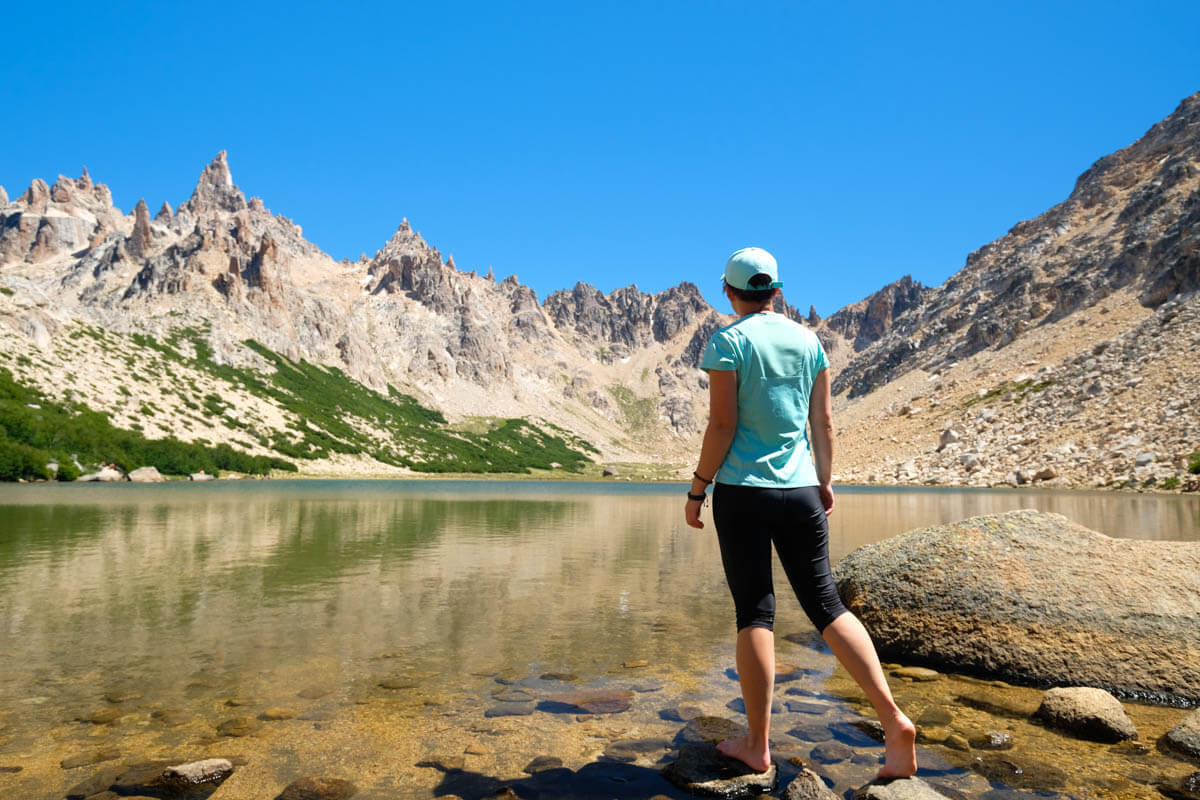
Travelling, hiking and adventuring solo is rewarding and empowering. Push those common fears aside and make way for the journey of a lifetime.
This was one of my biggest fears before solo travel. As it turned out, the very few times that I actually ended up on my own, I absolutely loved it. Hiking to Refugio Frey on my own allowed me to clear my mind, to truly listen to my thoughts and heart, and to prove to myself that I was capable of accomplishing anything I wanted to, even if I was on my own. It was an empowering and enriching feeling that shaped the rest of my journey as a solo traveller. It is still one of my favourite memories from my entire trip. I am certain you will have moments like these once you start yours.
4. Can You Still Get Everywhere and Do Everything on Your Own
I want to reassure you that it is still possible to get almost everywhere and do almost everything as a solo traveller. It doesn’t always mean you have to pay extra for being a solo traveller either. In most cases, you just have to be ok with not being able to lock these travel solutions in beforehand. You will have to trust in the ‘travel gods’ and the powers of serendipity. You need to believe in the likelihood that there are others out there just like you who want to tackle that same dream or activity. I can guarantee you that in almost all occasions there is at least one other person who would love to share in your adventure.
Have Faith in Serendipity
The Solution will Often Find You
Travelling on your own means you have the freedom to go wherever you want, whenever you want. For getting around, public transport is a solo travellers best friend. When there aren’t any public transport options available then the most cost effective way to get to those remote locations is usually to split the cost to hire a car, taxi or mini-van with other people. You can also give hitch hiking a go, if you find other people to hitch hike with along the way. The concern that most people have with these options is that you usually can’t pre-plan to have others with you when you want to do these things if you are a solo traveller.
I am here to tell you that you don’t need to panic and book an expensive tour to get to these hard to reach destinations. You also shouldn’t fear that you won’t find anyone to go with you either. You need to trust in serendipity and that it will all just work out in the end because that is exactly how it panned out for me time and time again.
My Own Experiences
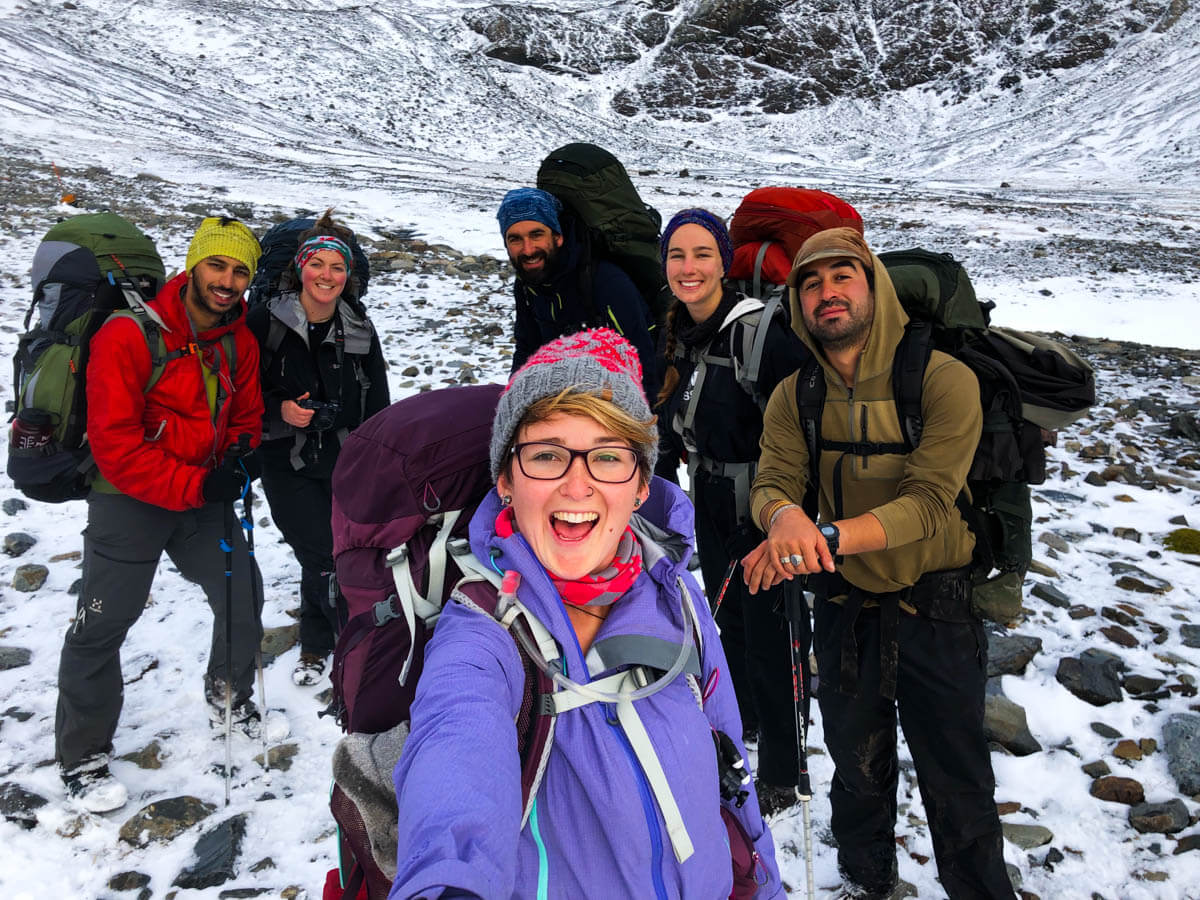
All four of us on the right started our time in Torres Del Paine as solo travellers, with the two on the left the only couple. By the end of day one, the six of us had become a team.
In my own experiences, I found that almost all of the situations I was concerned about, resolved themselves on the road. The solution either presented itself or worked out in a round-about way. In every instance it made for an interesting story, like this one, even if it did take a little longer with a few more twists and turns along the way. Travelling like this also provides an added opportunity to build friendships along the way.
Finding Friends Along the Way
I was so worried that I wouldn’t find anyone to hitch hike with on the Carretera Austral, where buses are few and far between. As it turned out, I ended up hitch hiking with some local Chilean people for quite a while who I connected with instantly and later stayed with when I was in Santiago. I also hitch hiked with an Israeli guy and then a French girl who both turned into incredible hiking buddies and life-long friends. I’m even hoping to cross paths with them again in later travels.
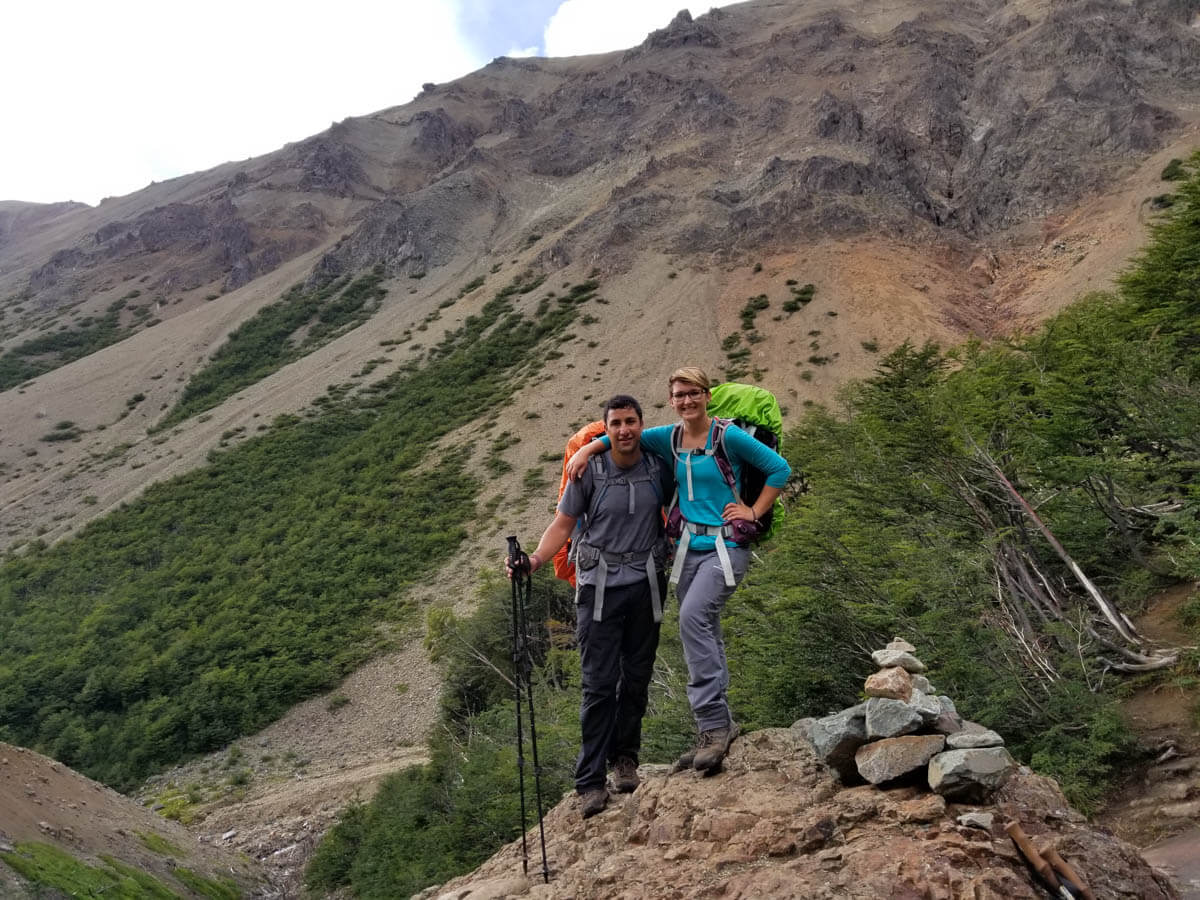
From hitch hiking, to actual hiking with my friend, Michael I met on the road on the Carretera Austral.
I was also worried that I would struggle to find anyone to do multi-day hikes with. Right from my very first overnight hike, up until my last 10 day hike I found hiking buddies without issue. I met people to trek with in hostels before setting off, while hitch hiking, and even on the trails themselves. Not only did my transport problem solve itself, but trusting that I would meet people on the road rewarded me with some of my most valued travel friendships.
Planning Ahead Works Too
If the idea of leaving everything to chance causes you too much anxiety or you just don’t have the time to be flexible enough for the above, then don’t fret. There are other options. You will need to spend a bit more time planning before you leave to make it work this way. But as long as you don’t mind research then you will be fine.
You will need to find out as much as you can about your options and the available transport, as well as cost and timing before you go. With the amount of blogs, guide books and Facebook groups out there now you can find an answer to almost every question you have without the need to book a tour for reassurance.
From there you will have found either a suitable option for one person, or have learned that you really need a travel buddy to know in advance that your trip will be affordable and possible. If the latter is the case, you can post to one of the many solo traveller Facebook groups and ask if anyone else would be interested in joining you on your travels.
They might have been longing for that exact same adventure and be happy to split the costs and tag along. You never know, you could end up with an incredible friendship out of it as well. If you need somewhere to start, here is a link to one of my favourite solo female traveller groups I’m in that is run by Be My Travel Muse.
5. What do You do in an Emergency Situation on Your Own
This may not be one of the most common fears, but for a lot of people who worry about all sorts of outcomes and situations on the road, it can be a concern.
You Probably Won’t be Alone
Whilst being with a friend, partner, or in a tour group can make an emergency or uncomfortable situation a little less stressful, it does not mean you can’t do it on your own or that you will even be on your own. In three of the four most stressful situations of my six month solo trip, I had someone by my side helping me through it (you all know who you are).
Travellers tend to stick together and support each other in stressful situations. Most of the time they are either in the mess with you or they have been in your exact position before. I found other travellers to be extremely helpful, friendly and supportive in these types of situations. When my mirrorless camera broke mid-hike in Patagonia my hiking buddy helped me sort out the logistics of finding a solution. When I became quite ill in Peru I had a friend by my side making sure I had everything I needed to get through it. I even ended up with some pretty amazing friends following a rollercoaster of an escape from riots and protests in Sucre, Bolivia. There is nothing quite like a heart-pumping emergency to cement a friendship.
The reality was that even in the one instance when I was alone, it still turned out ok. You will find you are a lot more resourceful, and stronger than you realise when the moment comes. None of us ever want any bad situations to eventuate. But getting through them with or without extra support will make you a stronger person and teach you an enormous array of life skills and coping mechanisms.
Stay Calm
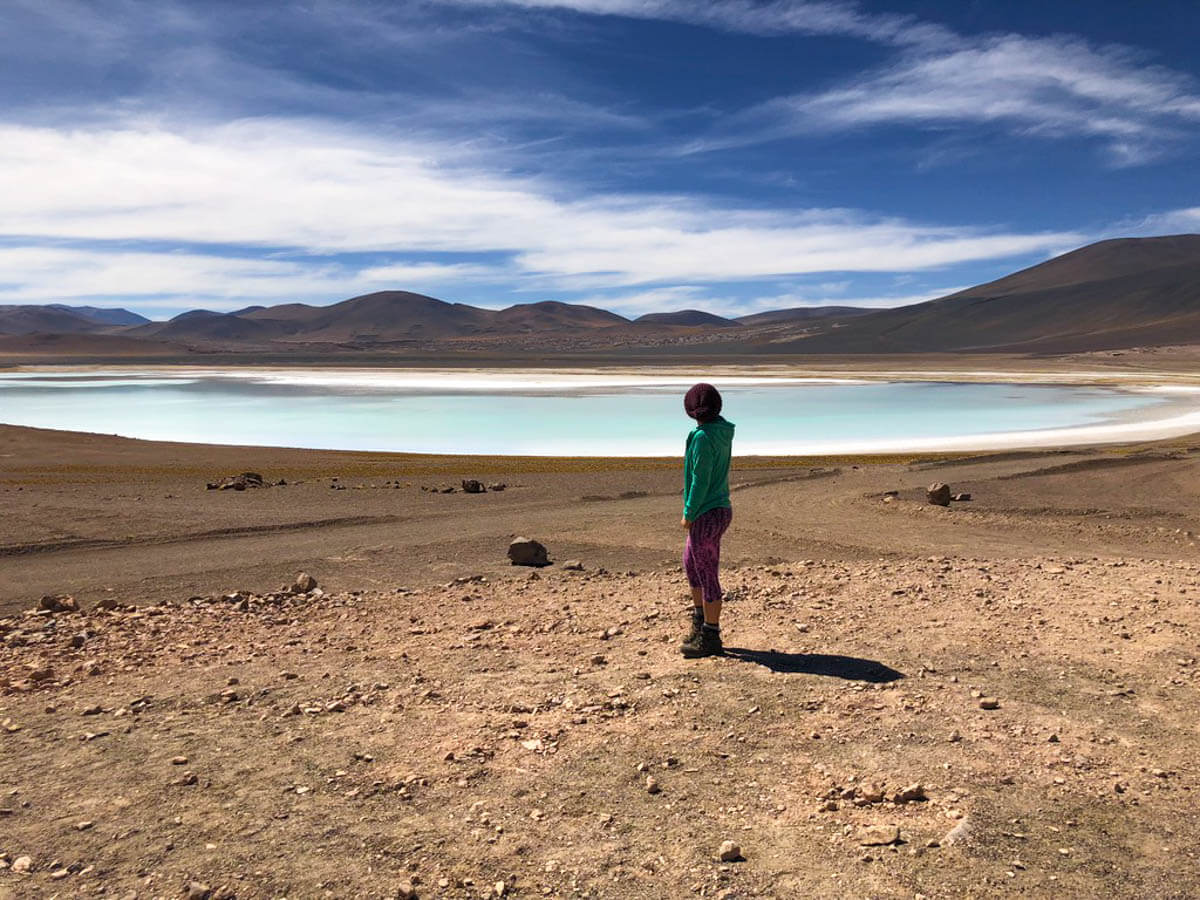
Sometimes it’s not easy, but keeping your cool will always make a difficult situation easier to resolve.
There are a number of unpleasant scenarios that can occur while travelling, and while at home. Often they seem a little more daunting overseas because of a number of factors. A language barrier, lack of reception or your physical location in relation to nearby help can all contribute to the situation feeling somewhat hopeless and endlessly difficult. My number one piece of advice in these situations, whether you are a solo traveller or not is to try and stay calm and positive. It is always easier to problem solve if you have a level head.
Research and Plan
My second piece of advice is to research and prepare yourself for potential situations and their possible solutions. If the time comes then you will know what to do. Familiarise yourself with the natural disasters prevalent in the region, the common local scams, and any health risks that are known for that particular area. This is especially important in developing countries. The assistance and emergency protocols in these places may be less readily available than what you may be used to at home.
Another handy tip is to find out where the embassy is located, to confirm if there are hospitals or emergency transport available for dangerous or solo adventure activities, and to check for any other assistance services. It is always a good idea to make sure someone back home who you are in regular contact with knows roughly where you are in the event something does happen.
Obtain Travel Insurance Before You Go
When to Buy Travel Insurance
Whether you are travelling for 10 days, four weeks, six months or even a whole year, you really shouldn’t leave home without travel insurance. You never think something bad is going to happen to you and then when it does, it is too late to go back in time and arrange cover for it.
When you are at home you are likely covered by some form of health cover whether it be public or private. You probably also have insurances for your valuables such as cars and contents. When you travel, you and your possessions are the most valuable thing to you, so why not insure them?
While overseas, you usually have to pay for every single cost associated with any sort of medical or emergency treatment and transport. I’ve heard so many stories of travellers stuck with bills upwards of $100,000.00 because they didn’t have travel insurance. While travelling, your expensive electronics, technical gear and general luggage are also at a higher risk of damage and loss than they are at home so having added protection for these items can make travel a lot less stressful as well.
My Own Experience
Before departing on my six month trip to South America I knew I would be tackling a lot of high altitude hikes, risky adventure activities and possibly coming into contact with dangerous illnesses and viruses. I also knew I would be taking fairly expensive photography gear, extensive trekking gear and my not-so-cheap MacBook. Due to this, I made sure I obtained a comprehensive travel insurance policy with a company I had heard to be reputable and with sufficient coverage for my needs; World Nomads.
As it turned out, I ended up claiming twice on my policy for unfortunate incidents involving both my mirrorless Fujifilm camera and a new iPhone I broke just after buying it on the road. The claims process with World Nomads was quick and easy, with the accidental damage incidents being covered and paid for without issue. I would highly recommend them for any traveller.
6. What if You Get Homesick
The thought of homesickness is another one of the most common fears about solo travel, and travel in general. The idea of being homesick while travelling on your own is a little more intense. It certainly shouldn’t be a fear that stops you from solo travel.
It Does Not Discriminate
The honest truth about home sickness is that it can, and probably will happen to you whether you travel solo or not. Often people get home sickness around the three month mark. This can occur regardless of who you are travelling with, what you are doing or what country you are in. Being with friends, on a tour, or with a partner doesn’t stop home sickness. You can still miss your home comforts, your usual friends and hobbies, and your family no matter who you travel with.
How to Overcome It
Although homesickness is usually inevitable at one point or another during travel there are some ways to overcome it. Sometimes people are just missing home because they are burnt out and are in the travel slump. Sometimes people become tired of moving around, packing and unpacking, and negotiating inter-city or international travel all of the time.
The easiest way to fix this is to stay in one place for a while. You should pick a destination and stay there for a little longer than planned. Make the time to do some regular, everyday things you would do when you are back home. You should buy proper groceries and cook some more elaborate meals in the hostel kitchen. Do some daily exercise as part of a more structured routine. Schedule a block of time to chat with friends and family back home. This will allow you to obtain more detailed updates from them and feel a little less out of the loop. Do some planning for your next destinations. This can be really useful if research puts your mind at ease. At the end of the day, make sure you give yourself some breathing room.
My Own Experience
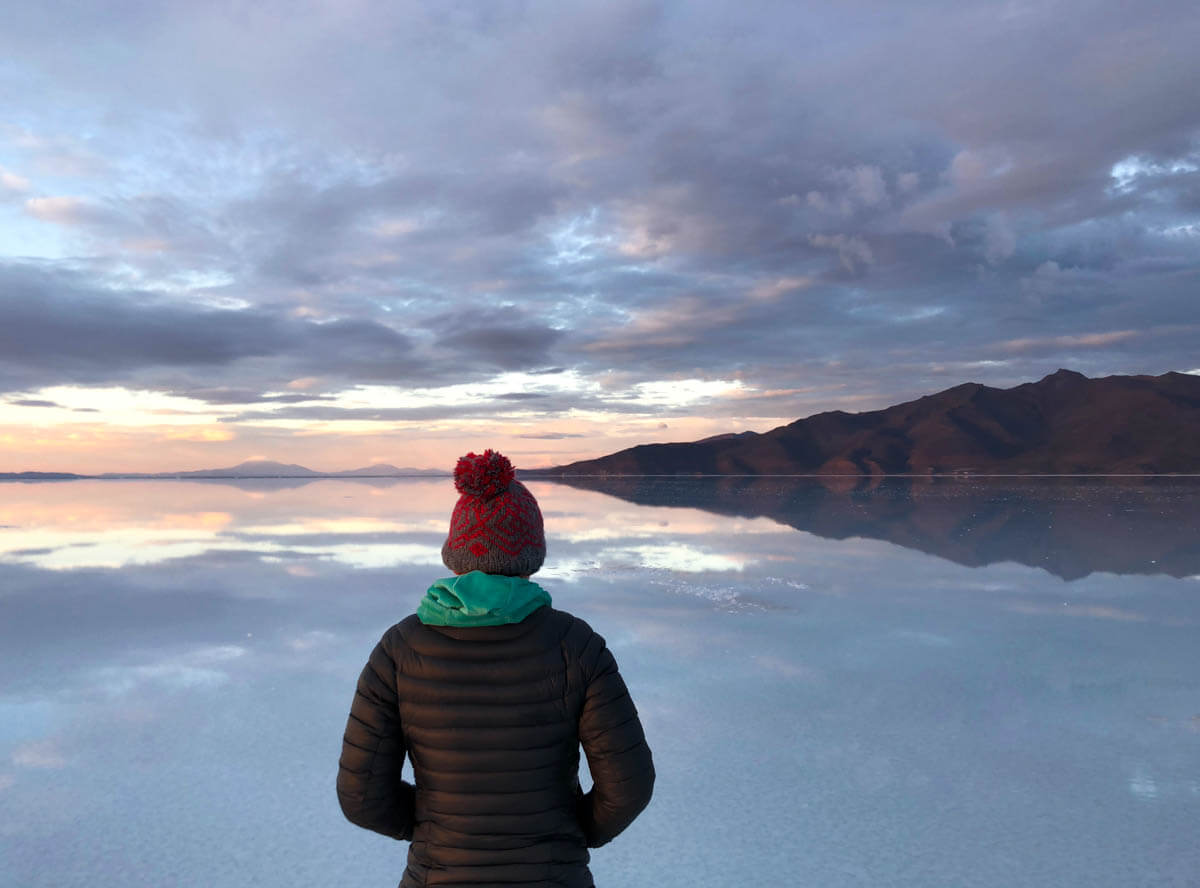
Even when you are having the time of your life you can still get home sick and hit the travel slump.
I experienced the travel slump around the three month mark of my trip, which I wrote about in this post. I turned to many blogs and Facebook groups to see if others had experienced the same thing. An excellent, and short post on the topic I read is this one by Nomadic Matt. After reading a lot about it I realised it was pretty common and that I wasn’t alone.
When I first experienced the signs of travel fatigue I decided to stay in Sucre, Bolivia for a little while. I had hoped studying Spanish and having more of a routine would help. When that wasn’t really working I decided to set myself new goals and plans moving forward. I made sure I was making the decisions that were right for me. It was important that I didn’t let the thought of what anyone else would think cloud my judgement. I wrote about this decision and how it felt right to listen to my own needs in this very honest post here. Once I did this I found I had a little more direction and purpose, with a whole lot less anxiety. Sometimes this is all we need.
You can Always Go Home
This is Always an Option
If you have done all of these things and it still isn’t enough, then you also need to know that you can always go home if you really need to. A wise friend on the road once told me that you are only ever a few flights, buses, or trains away from home. If you really need to go home, then you have the option there. You need to do what is right for you. Just knowing that the option to go home is there can help you push past the home sickness and continue on with your trip as planned. Failing that, if you end up coming home, then that is ok too. You should never regret the decision to do what was right for you at the time.
My Own Experience
After pushing through my three month slump, I ended up coming home at around the six month mark. I just wasn’t enjoying the trip as much as I was in the beginning. I wasn’t experiencing the same overwhelming excitement and life changing experiences I had in Patagonia. It had begun to feel like I was travelling just for the sake of travelling. If I had gone home around the three month slump, I know I would have wished I’d persevered. After pushing on and then still feeling the same at the five month mark I knew it was time for me to hit pause and take stock of where I was headed.
Coming home at that point gave me the opportunity to recharge and reassess what my travel and life goals were. It also allowed me to spend time with family and friends. It also meant I could attend my cousins’ wedding and be there to meet two new babies in the extended family. Family has always been important to me and always will be. Being able to go on some incredible road trips with my mum while I was home and spend some extra time with my brothers and my dad was exactly what I needed to get my travel focus back on track.
Moving Forward
I’m now in the process of planning my next steps and feel a lot more excited and confident about it. This time around, I am not going to let the common fears of solo travel get to me before I go. At the end of the day, you need to do exactly what is right for you and not what anyone else wants or expects of you. Solo travel makes that entirely possible. That is exactly why I hope you push these common fears aside and tackle your own adventure.
Put the Common Fears Aside and Solo Travel Now
Even knowing how well all of these scenarios worked out, I still worry about what will happen on my next solo adventure. It is only human to be nervous before embarking on something unknown. In saying that, the unknown is also part of the magic of solo travel. Please don’t let these common fears get in the way of chasing your dream. Trust in yourself, in the kindness of strangers and other travellers, and in your sense of adventure. Allow yourself the opportunity to go on the journey of a lifetime. Get out there and start your solo travel adventure now.
I hope this post has helped put your mind at ease about some of the most common fears surrounding solo travel. If you found this guide useful then please save it for later on Pinterest. You can also share it to Facebook, or with your friends who are considering setting off on the journey of a lifetime.
--Girl Seeking Purpose
This post contains affiliate links, which means that if you follow a link for a product or service and make a purchase, I receive a small payment at no extra cost to you. I only recommend products or services that I have used, trust and would honestly recommend to my readers. Building affiliate links into my site will help keep my blog going and continue to allow me to produce the content that I hope you are all enjoying reading.
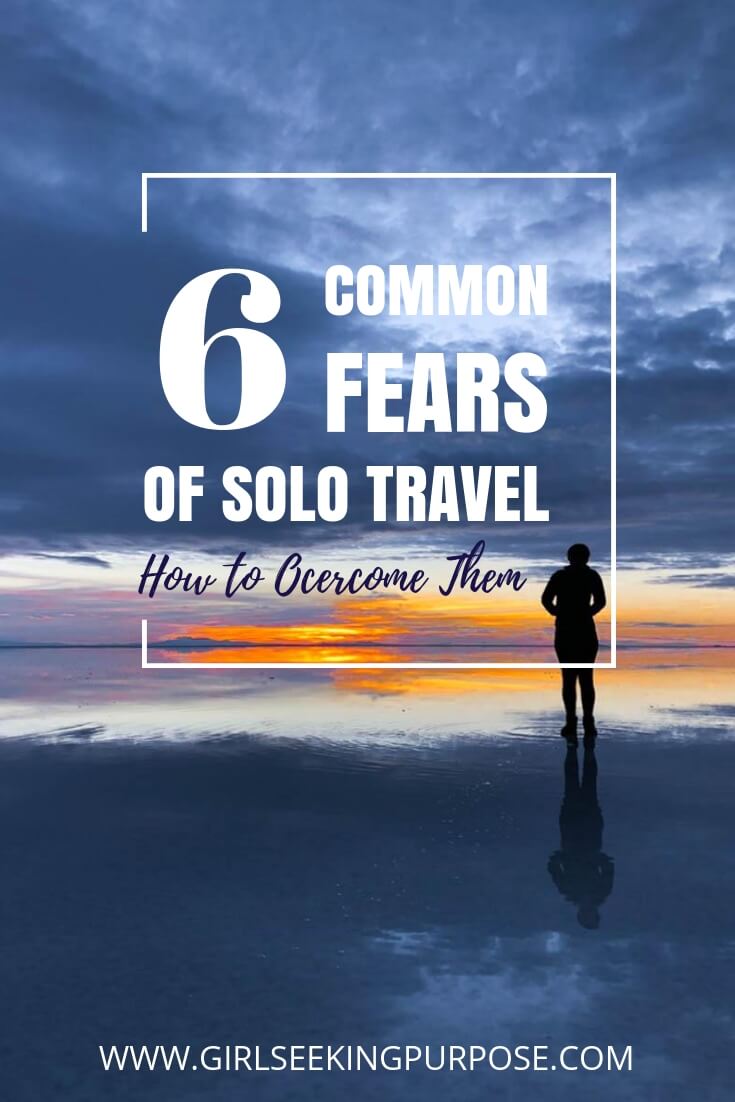


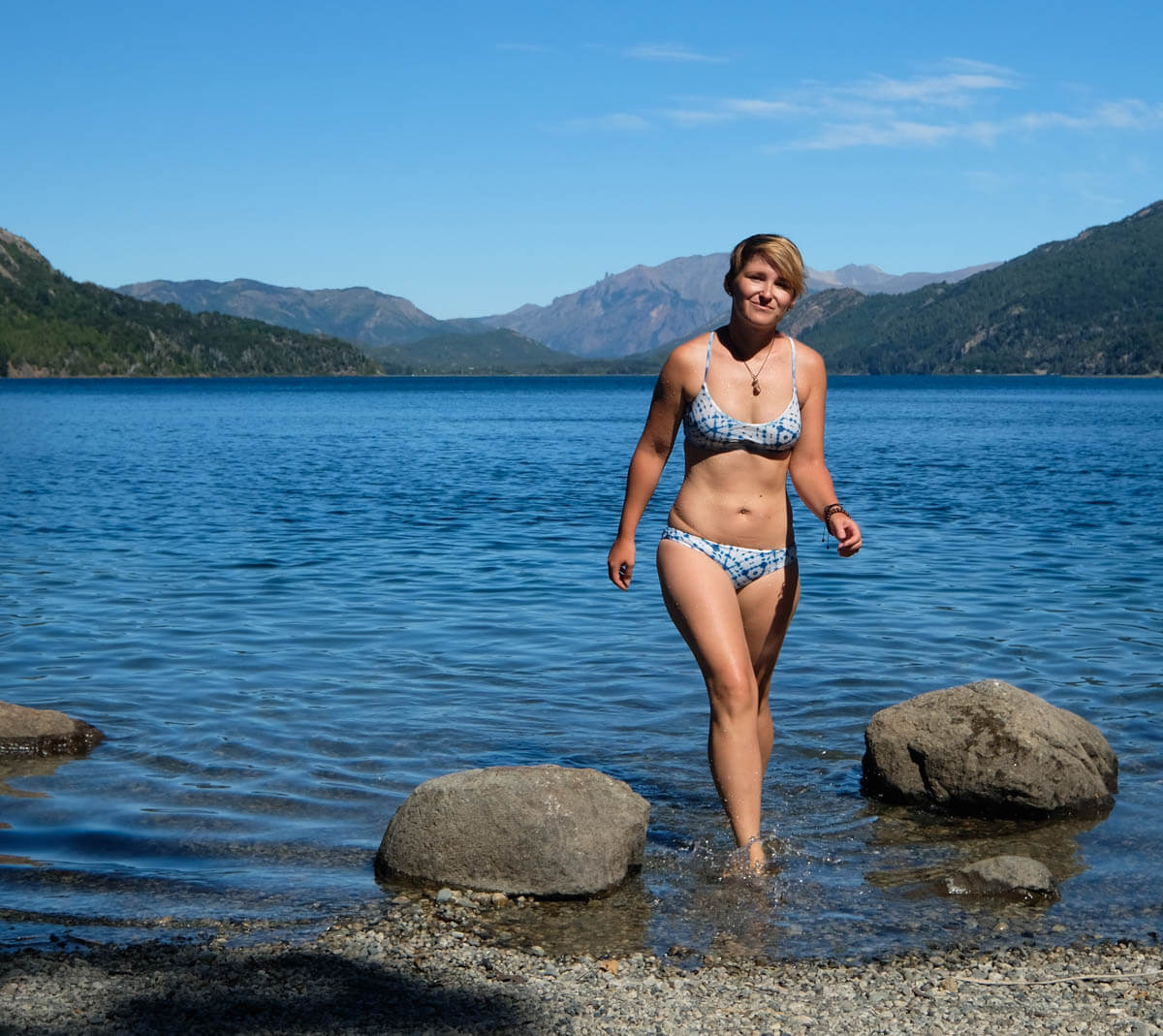


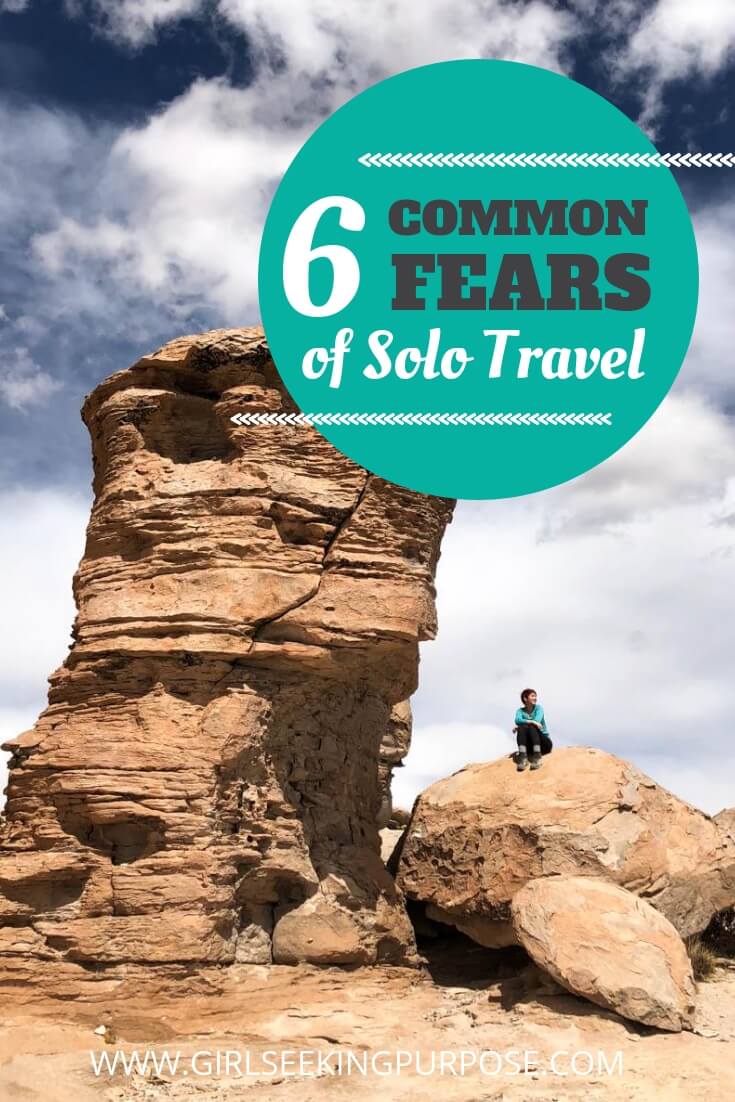
This is a very, very informative and well written article! Thanks a lot Caitlyn!
Hi Gianluca,
Thank you for your feedback and I’m really glad you found the article helpful! 🙂 Love your site, looks like you are also embracing the solo travel life! 😀
Cheers,
Caitlyn x